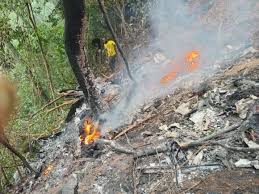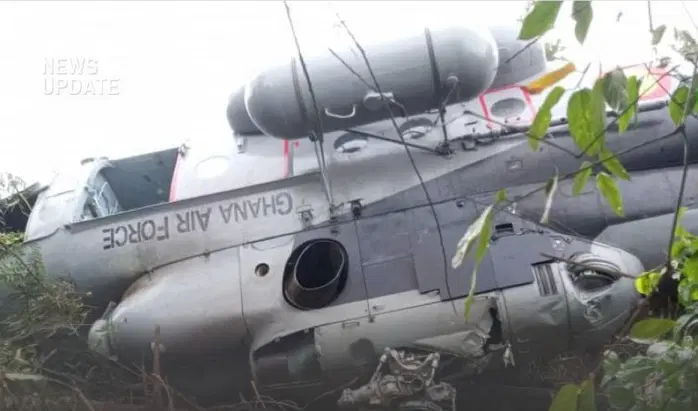The helicopter crash investigation in Ghana has drawn attention to how state institutions handle matters of national security, accountability, and transparency.
Bright Simons, Vice President of IMANI Africa, has welcomed the approach of the Acting Minister of Defence and Finance Minister, Cassiel Ato Forson, for resisting calls that the military investigate itself in the recent tragedy.
Instead, the Minister has ensured a civilian-led process by including the Accident Investigations and Prevention Bureau (AIB) in the formal board of inquiry.
According to Simons, this step reflects a conscious effort to respect Ghana’s institutional framework while creating room for independent oversight.
“Good to see the interagency makeup of the investigation and the integrative role of national security. The only thing I am a bit uncomfortable about is the suggestion that the AIB is a part of the Ghana Civil Aviation Authority. It shouldn’t be.”
Bright Simons

Simons pointed out that there is a common misconception that the AIB functions under the Ghana Civil Aviation Authority (GCAA), but in reality, that should not be the case.
He stressed that linking the bureau directly to the GCAA raises concerns, as its operations are meant to remain independent.
Autonomy And International Standards
Tracing the evolution of the AIB, Simons highlighted that the bureau was initially set up in 2019 as a unit within the GCAA. By 2020, however, international assessments exposed structural weaknesses.
The International Civil Aviation Organization (ICAO), during its inspection of Ghana’s Search and Rescue protocols, emphasized the need to enhance the independence of the bureau.
“Yes, until 2020, the AIB was a unit within the Ghana Civil Aviation Authority following its setup in 2019,” Simons recalled, adding that ICAO’s intervention shaped subsequent reforms.

Ghana, sensitive to its Article 13 obligations under the Chicago Convention, responded by enacting Act 1028, which officially granted the AIB autonomy.
This decision, Simons argued, was not about creating another bureaucracy but rather about ensuring effective oversight. “I am not usually a big fan of multiplying narrow institutions. But in this case, there was a sensible basis.”
His concern now is whether there has been any attempt to reverse this independence quietly without proper consultation.
Civilian Oversight And Institutional Credibility
For Bright Simons, civilian oversight in sensitive cases like this is not merely symbolic but crucial for public confidence.
Aviation is a vital sector for Ghana, with growing passenger traffic, cargo operations, and investment interests.
Accordingly, he pointed out that a credible, independent investigative body like the AIB reassures both citizens and international stakeholders that safety and accountability are not compromised.
“I hope there hasn’t been a quiet kidnapping of AIB by GCAA without serious consultations. Aviation is a fairly rich industry in Ghana. There are multiple ways to fund the AIB.”
Bright Simons
As such, he stressed the importance of sustained independence.

By including the AIB in the crash probe, the acting Defence Minister has helped set the tone for a process that values transparency.
It also signals that Ghana is willing to embrace international standards rather than rely solely on internal processes that may lack credibility in the eyes of the public and the global aviation community.
Ghana’s Aviation Safety Faces Reality Check After Helicopter Crash
Ghana’s aviation sector has long been lauded on paper for its systems and frameworks. When ICAO conducted audits of the country’s Search and Rescue structures after the legal reforms, the results appeared promising.
However, Simons warned that a significant gap exists between policy documents and real-life implementation.
This acknowledgement underscores the importance of the current investigation. It is not just about establishing the cause of a single helicopter crash but about identifying weaknesses in the country’s broader aviation safety environment.

Simons expressed hope that the inquiry will move beyond technical details and provide recommendations that strengthen institutional credibility, improve readiness, and close the gap between Ghana’s aviation policies and their real-world application.
In the end, the helicopter crash probe represents more than just an investigation into a tragic incident.
It is a test of how Ghana balances military responsibility, civilian oversight, and international obligations. By involving the AIB, the Defence Minister has demonstrated a willingness to pursue a path that aligns with best practices.
Whether this decision becomes a turning point in Ghana’s aviation governance depends largely on the independence of the investigation and the seriousness with which its findings are implemented.
As Simons emphasized, the task ahead is to ensure that the process not only uncovers the truth but also lays the groundwork for safer skies in the future.























